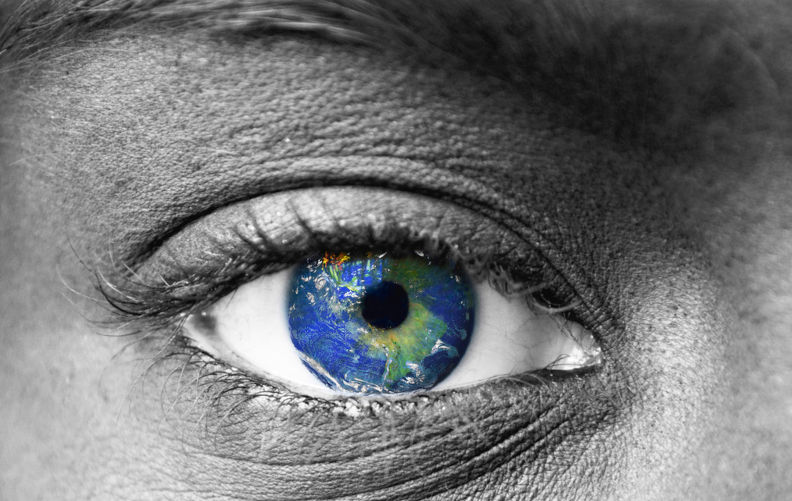Eyes to see
July 12, 2024
It’s easy to turn a blind eye when the victims are Other, but what if the victims are us? What does it mean to ‘face away from what it means to be human’?
I’m at the optometrist, trying on Ralph Lauren frames and deciding between tortoiseshell and pink. I notice a poster on the wall for the Fred Hollows Foundation which says that Aboriginal and Torres Strait Islander people are three times more likely to have vision impairment or go blind than other Australians. I wonder about the symbolic relevance of this, about how our minds speak to our bodies about what can and can’t be held, what flows into symptoms and pathology.
I am reminded of a study of Cambodian women who went blind after witnessing the horrors of the Pol Pot regime. Researcher Gretchen Van Boemel first noticed that the women were disproportionately affected by ‘ ‘functional blindness’ - blindness or visual problems caused by psychological factors’, in 1984. The women affected had witnessed the death of children and family members, one woman recalling her three month old baby being thrown against a tree by a soldier until he died. It was too much to witness, too much to see.
In his book The Myth of Normal, Gabor Mate helps us draw a connection between trauma and disease, saying that if a society is ‘facing away from what it means to be human, pathology cannot but ensue.’
What does it mean to ‘face away from what it means to be human’? Gabor Mate highlights the necessity of belonging, looking after ‘one another, and feel[ing] caring energy flowing toward us’. Can we say that we care for one another in Australian society? Neuroscientist Bruce Perry tells us that ‘when people start to lose a sense of meaning and get disconnected, that’s where disease comes from’. Are we surprised, then, that the Indigenous and Torres Strait Islander populations of Australia experience disproportionately high vision impairments?
A few days later I am reading a book about Albert Namatjira to a grade 3/4 class. I am shocked to discover that Namatjira was one of the first Indigenous Australians to be granted citizenship, in 1957. It wasn’t until 1967 that all Indigenous people became citizens, less than sixty years ago. Indigenous people have been able to own land in this country for less than sixty years, yet we calmly report in the 2021 census that approximately 25,000 Indigenous Australians are homeless and that they are almost 9 times more likely to be without housing than other Australians. This is our responsibility.
How can First Nations communities compete with White Settler communities with hundreds of years of intergenerational wealth and land ownership and inheritance? Who is really blind, here?
Albert Namatjira eventually died of heart failure, which his grandson Vincent Namatjira describes as a broken heart.
Rapper and activist Ziggy Ramo shares the struggle of the Original People in his book, Human. He reflects on the lives of his grandparents, who were ‘stripped of self-determination and every aspect of life was controlled’. We tend to feel that this is a thing of the past, but Ramo reminds us that Indigenous deaths in custody continue to climb to ‘the rate of almost one death every week’ and that ‘today … Original children are being forcibly taken away from their families at a higher rate than what was seen during the ‘Stolen Generations’’. Ramo connects the dehumanising patterns back to the Doctrine of Discovery, a series of papal bulls from the 1400s declaring that individuals are not considered human unless they are Christians. This is the logic that permitted Australia to be declared Terra Nullius, and the foundation stones of these beliefs still lie beneath the laws and practices of our society today. ‘People are the system’ says Ramo, ‘We are the governments, we write the laws, we are the police, we are the educators’, how can we begin to relate to our complicity?
In the film Final Account, filmmaker Luke Holland interviews ordinary citizens who were involved in the crimes of the Third Reich. As we are taken on a journey around a concentration camp, it is alarming to hear people speak casually of how ‘most people benefited from it, they could work here and earn money’. In the grinding realities of everyday life it seems possible to willingly blind ourselves to the dehumanisation we are inflicting. Auschwitz survivor Primo Levi wrote, ‘Monsters exist, but they are too few in number to be truly dangerous. More dangerous are the common man, the functionaries ready to believe and to act without asking questions.’
As I drive home from the optometrist, I pass a billboard declaring that bowel cancer is the deadliest cancer for Australians aged 25-44. What are we unable to digest?
It’s easy to turn a blind eye when the victims are Other, but what if the victims are us? Researcher and decolonial mastermind Nikki Sanchez calls on us to remember that decolonisation is for everyone. She raises questions about the trauma experienced by settler people when we are complicit in violent histories. She reminds us that we are all colonised, many of us bystanders, that we have a responsibility. The way we are living is making us all sick. Is it surprising that our colonised colons harbour this festering disease? Your freedom is my freedom, and my freedom is your freedom.
What will it take to understand this?
